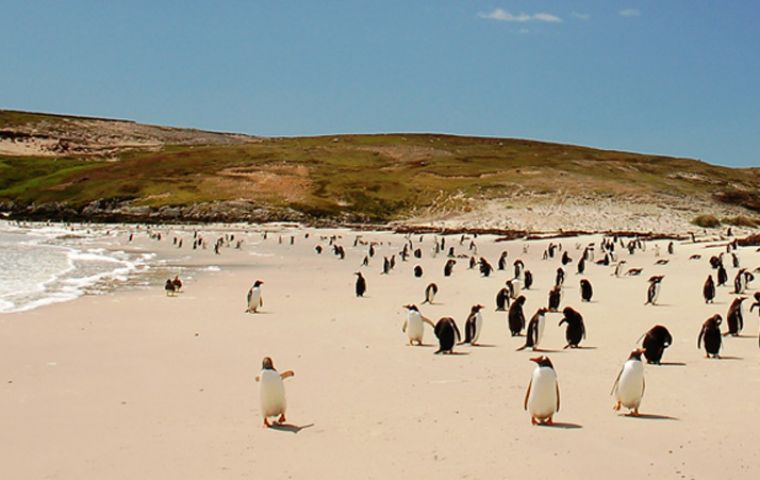MercoPress. South Atlantic News Agency
Falklands’ penguin population rising: Gentoo doubled and Rockhopper remains stable
 The Islands have the largest gentoo population in the world and second in Rockhopper penguins (Photo: S. Jaffray)
The Islands have the largest gentoo population in the world and second in Rockhopper penguins (Photo: S. Jaffray) According to the most recent count in the Falklands, the number of Gentoo penguin breeding pairs has doubled when compared with the number counted during the last census in 2005. Rockhopper penguin numbers are reported to be stable.
With the Gentoo population now estimated to be 132,321 breeding pairs, the largest number reported since the first estimate was generated in 1933, the Falkland Islands is likely to be the largest component of the global population.
The report on the 2010 archipelago-wide census of Gentoo and Rockhopper penguins was presented by Falklands Conservation Officer Al Bayliss at Wednesday’s meeting of the Environmental Committee in Stanley.
Mr Bayliss stressed that Gentoo populations typically show substantial inter-annual variation in breeding numbers, adding that the figures contained in the report were estimates.
“Inter-annual variability probably reflects adult birds skipping a breeding season, deferred breeding and lower recruitment related to years of reduced food availability or other environmental perturbations,” which makes detecting systematic changes in population numbers difficult, he told the committee chaired by Legislative Assembly Member Dr. Barry Elsby.
But Mr Bayliss said he felt “very positive” the Gentoo population was indeed on the increase and this had been backed up by reports from most local landowners monitoring rookeries.
The situation with Rockhopper penguins, which the Falklands is estimated to be home to some 36% of the global population (second largest after Chile) has, according to the census, “become stable.”
Mr Bayliss said the population, now estimated to be 319,163 (18,503 breeding pairs) seemed to have recovered to the 2000 estimate, but added there was still no evidence of recovery to the 1930s levels when an estimate of 1.5 million breeding pairs was made.
Mr Bayliss stated in his report that due to a lack of population data for Rockhoppers from the 1930s to 1980s, it was unclear whether the decline was gradual, stepwise or sudden.
However a mass mortality event in 1986 (attributed to the starvation of adult birds during moult) had resulted in further population declines as well as an estimated decline of some 90,000 pairs between 2000 and 2005, likely to have been caused by a harmful algal bloom in 2002
The decline of the Falkland Islands population of Rockhopper penguins mirrored severe population declines at other key Rockhopper penguin populations and implied that broad scale ecosystem changes were likely to be involved, he said.




Top Comments
Disclaimer & comment rules-

-

-

Read all commentsI see the original population of the islands are thriving. More than can be said about Argentina, because they're all dead.
Mar 21st, 2012 - 09:51 pm 0These then, should in fact replace the Argies, as they practice what they preach,
Mar 21st, 2012 - 10:16 pm 0peace and harmony
Long live King penguin .
That's Dr Bayliss to you. And a PhD from an actual university for real work ;-)
Mar 21st, 2012 - 11:38 pm 0Commenting for this story is now closed.
If you have a Facebook account, become a fan and comment on our Facebook Page!